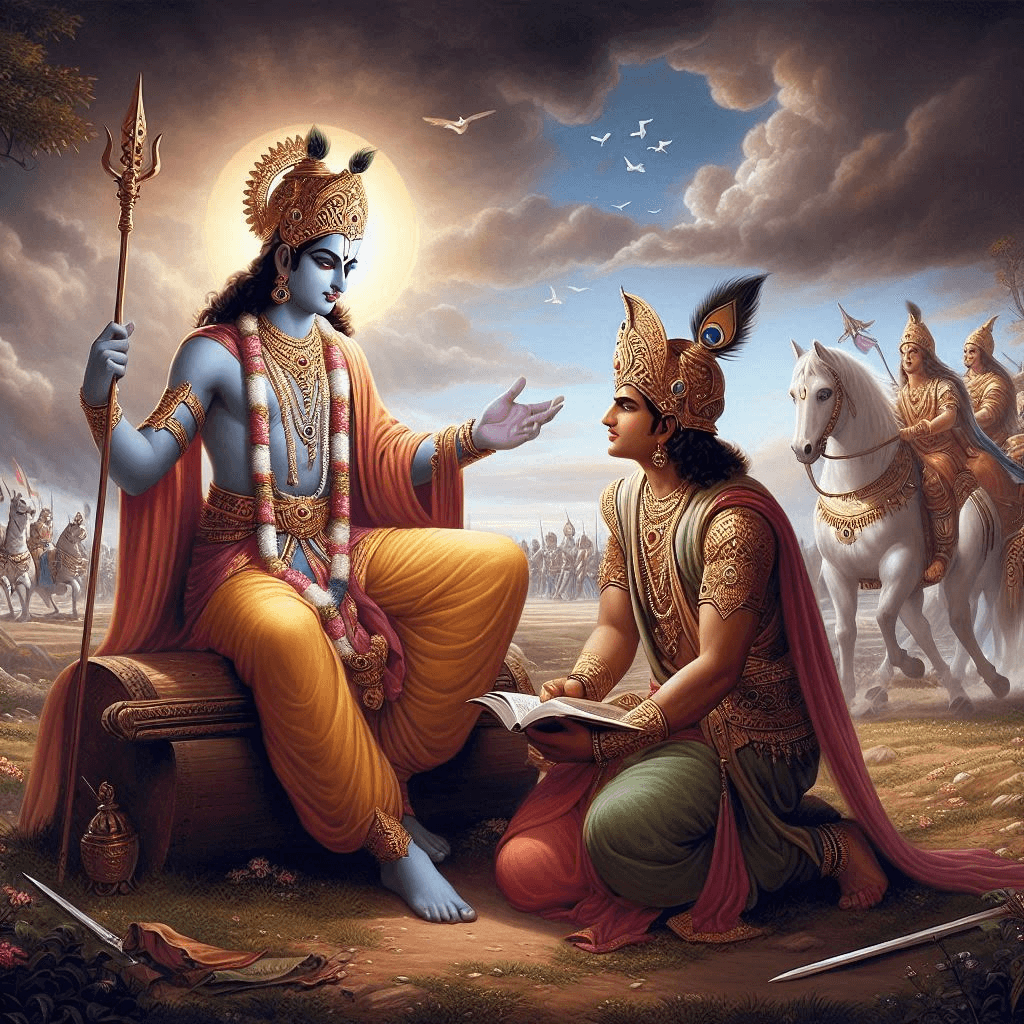(“You have a right to perform your prescribed duties, but you are not entitled to the fruits of your actions.” Bhagavad Gita, Chapter 2, Verse 47)
Introduction to Stress Management in the Bhagavad Gita
This fast paced and modern materialistic world has added a new woe into our lives, Stress. Many of us are turning to therapy or medication to cope. Wouldn’t it be great if I told you there is an ancient book that will solve all your problems? The Bhagavad Gita is what it is called
Imagine a battlefield—where the warrior Arjuna faces a moral dilemma. He has to choose between killing his family members and his moral obligation. In this pivotal moment, Lord Krishna, his charioteer and guide, teaches Arjuna a life lesson that is going to impart knowledge and wisdom in the coming generations.
Every verse of Bhagavad Gita uncovers magic which is still relevant in this modern world. Come join me in this adventure where Lord Krishna and his age-old teachings will help you manage stress and transform your life.
Understanding Stress: Causes and Impact
“The senses, mind, intellect, and determination are the different components of the embodied self. The Supersoul is situated as the overseer of these.” ( Bhagavad Gita, Chapter 2, Verse 60)
Stress is the feeling of being overly eager or mentally tense. Stress is an unavoidable aspect of modern life and the invisible force that seizes our minds, bodies, and souls. To learn more about the causes of stress, continue reading.

External Stressors:
Family: It is life’s greatest irony that the ones we love can sometimes also be our greatest stressors. Like illness of family members, seeing your parents grow old or children not doing good in school— all contribute to family-related stress.
Relationships: While healthy relationships are a stress buster, they can also strain us. Poor or miscommunication, mistrust, or a partner’s health issues can lead to relationship stress.
Financial Struggles: Difficulty in making ends meet due to debt trap, low-paying jobs or some unexpected expenses can cause stress due to financial struggles
Workplace Challenges: Toxic work environments, not able to manage work-life balance, rude bosses or seniors can also cause stress.
Internal Stressors:
Feelings of Failure: Doubting your skill and ability, uncertainty about future, low confidence, can cause internal turmoil.
Health Concerns: Unfit body, Major injury, personal illness, can trigger stress.
Life Transitions: Sudden Life transitions like retirement, moving to other place or becoming a parent can also cause stress.
World Problems: Major Global events like pandemics, violence, and political unrest can also affect our mental well-being.
Remember, stress isn’t our enemy; it’s our response that matters.
Emotional Stability (Sthitaprajna) as a Key Component
“When one discards all selfish desires and cravings of the senses that torment the mind, and becomes satisfied in the realization of the self, such a person is said to be transcendentally situated.”( Bhagavad Gita, Chapter 2, Verse 55)
There is a concept in The Bhagavad Gita which is called as Stithaprajna which translated as ‘Emotional Stability’.
Emotional stability means a person is in control of his mind, thoughts and emotions. Having control of one’s emotions in all situations is called as Sthitaprajna, a person of steady wisdom. The person who is having emotional stability or having control over emotions will not let action of someone to destroy one’s inner peace.
The Bhagavad Gita describes a person of stable wisdom (Sthitaprajna) as someone who is emotionally stable and has control over their emotions. The person who is not affected by other’s opinion and judgement. This is achieved by letting go of desires, not being affected by positives or negatives, and not being influenced by attachment or detachment.
Remember, mastering emotions is not about suppressing them but about channelling them wisely for a harmonious existence.
The Four Vital Steps for Achieving Emotional Stability

As per the The Bhagavad Gita, Emotional stability can be achieved by practicing four vital steps
1. Control of the Senses (Indriyanigraha):
Control over emotions cannot be achieved without controlling one’s senses. Senses are the gateways to the mind.
For example, Imagine you are working on a very important task but your smartphone keeps on buzzing with new notifications from a social media app. Your senses are forcing you to pick the phone and interact with it but, By controlling your sense of touch(Picking the smartphone up) and sense of sight(looking at the screen) you can keep working and finish the task on time.
2. Mastery of the Mind (Manonigraha):
The mind is often described as a restless monkey. Taming it through practices like meditation is essential.
Our mind is getting filled with many irrelevant information which we are getting through social media and various digital platforms. Taking break from technology either by restricted Smartphone use or by digital detox, will definitely help in giving your thoughts more clarity.
3. Cultivation of Dispassion (Vairagya):
Attachment to desires is a primary cause of emotional instability.
Desire in any form will kill your mental peace and happiness someday. Desires comes with attachment and expectations and when attachment and expectations turns sour it will cause mental trauma and stress. Detachment from materialistic things is very crucial in achieving Emotional Stability.
4. Knowledge of the Self (Atma-Jnana):
Understanding one’s true nature as a soul distinct from the body and mind leads to a sense of peace and stability.
An artist while creating their art delves into their inner self. They find that their best work emerges when they are not trying to impress others but are simply expressing their true nature. This process of creation becomes a form of meditation and self-discovery.
Teachings from Bhagavad Gita to get rid of Stress and Anxiety

Detachment from Outcomes: The Bhagavad Gita reminds us that we have control over our actions but not over the outcomes. By focusing solely on performing our duties without being attached to the outcome, we free ourselves from unnecessary stress and anxiety. We learn to live the life in present and to not to think about the result or the future.
Spiritual Consciousness and Material Pursuits: Material things, no matter how promising, can never provide lasting bliss to the spirit soul. When we focus on our spiritual objectives and revive our spiritual consciousness, we align with our true nature. Deviating from this awareness leads to struggles and overwhelm, as we become entangled in the world of dead matter. Balancing material pursuits with spiritual understanding is essential for inner peace and well-being.
Fear is Disability
It’s difficult to achieve when people have a sense of doubt about them. Anxiety, or more precisely, a lack of confidence in their abilities, It would not only render them incapable of achieving their goals due to fear, but it would also render them futile. The roof isn’t an issue for brave souls. Fear of the future, as well as low self esteem, are two of the impediments that will prevent people from achieving their goals.
Understanding the True Self: The ancient texts of the Bhagavad Gita emphasize the mistaken identity of the self. Human beings, and indeed all living entities, are not mere products of dead matter. Instead, they are constituted of a divine energy far superior to dull material substances.
Recognizing our spiritual identity and purpose helps alleviate anxiety and connects us to our natural element.
Change is the only constant
In essence, “permanency” denotes nothing in human life. Our Mother Earth is in a constant state of rotation. She has no intention of ever stopping. The day follows the night. Summer is followed by the nicest downpour. When people accept change as an unavoidable part of life and accept it as a normal part of life, they will be more willing to deal with difficult situations in a calm manner.
“For the soul there is neither birth nor death at any time. He has no beginning and will have no end. He is unborn, eternal, ever-existing, and primeval. He is not slain when the body is slain.”( Bhagavad Gita, Chapter 2, Verse 12)

Amazing, short, simple and to the point